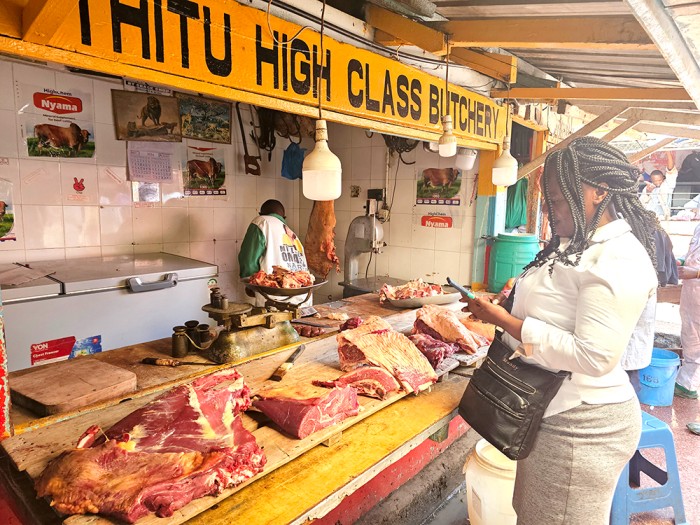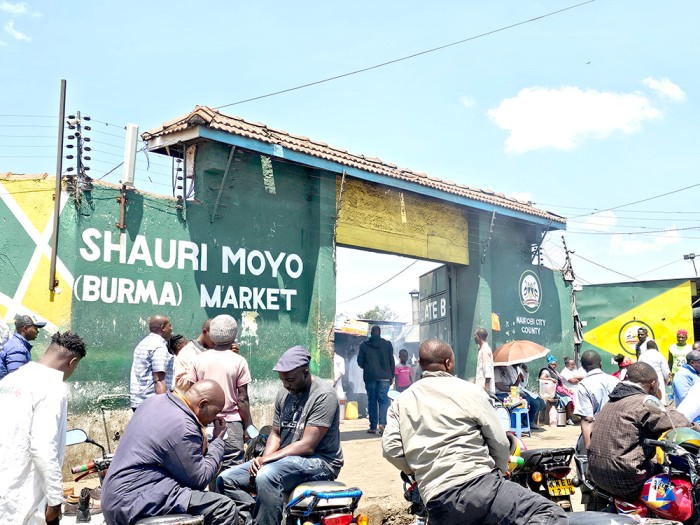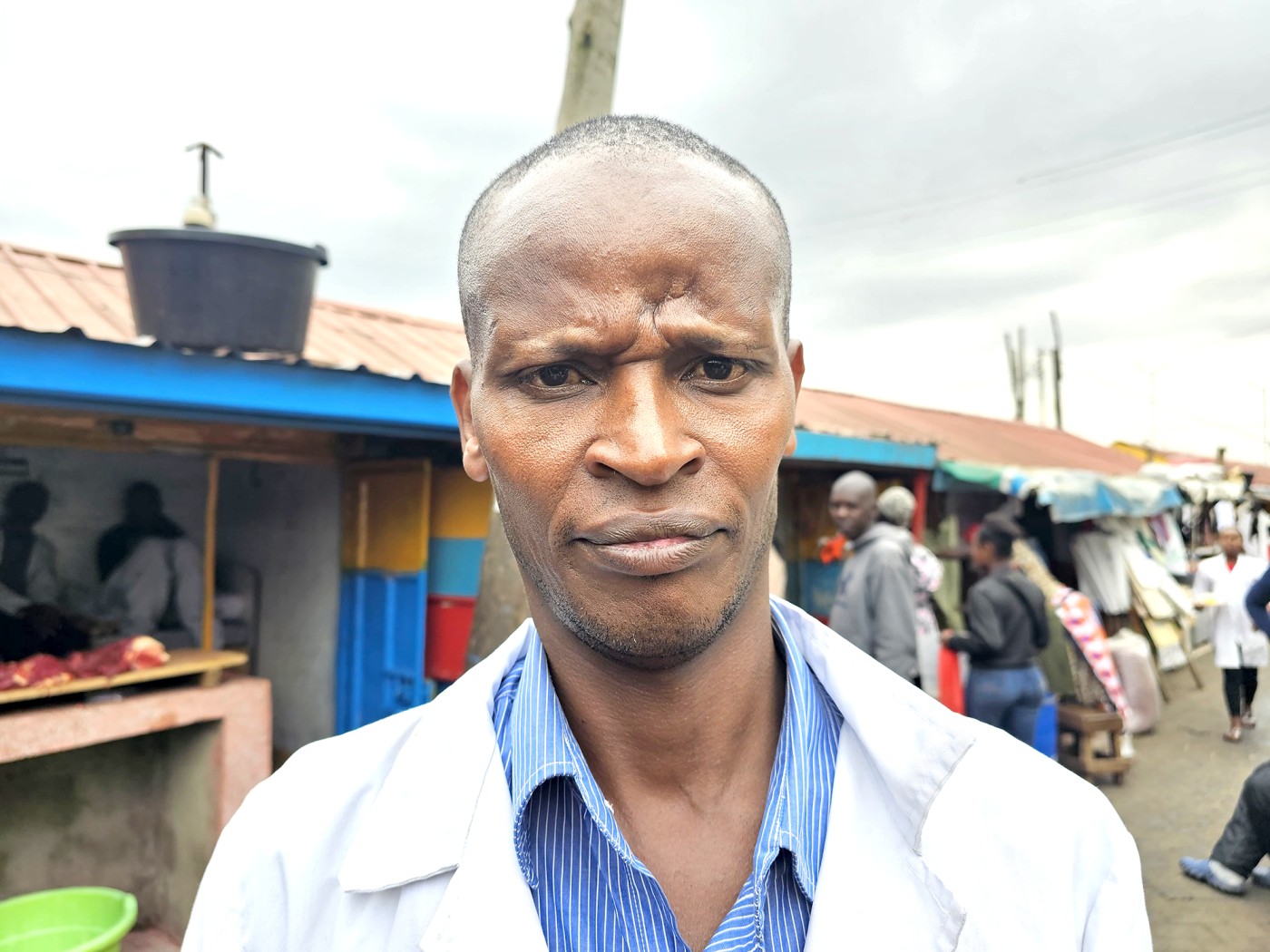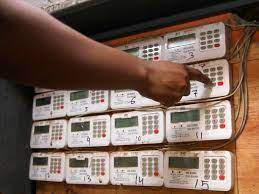Nairobi's Burma Market where meat lovers flock to get the choicest cuts

Burma Market is supported by an extensive supply chain, with slaughterhouses in various counties across Kenya ensuring that fresh meat is delivered by sometimes 4 a.m. every morning.
Located at the heart of Shauri Moyo in Nairobi's Kamukunji Constituency, Burma Market stands as one of Kenya's largest and most renowned meat markets. Known for its bustling activity and variety of meat products, the market is a vital supply point for both individual buyers and businesses throughout Nairobi.
Upon entering the market through Gate A, visitors are immediately struck by the strong smell of fresh meat. The air is filled with the sounds of butchers at work, preparing various cuts of beef and other meats for sale. This entrance is a gateway to a hive of activity where the day begins early, with hundreds of people flocking to secure the best cuts of meat. By around 6 a.m., the market is at its peak, with buyers haggling and negotiating prices with the numerous butchers operating in the area.
More To Read
- Kamukunji MP Yusuf Hassan to sponsor 120 underprivileged students in technical training
- The high cost of waste: Nairobi's landfills and the hidden toll on human health
- How coach Sabina is shaping young lives beyond the pitch in Shauri Moyo
- Demolition of Woodley houses signals an end to Nairobi's colonial estates
- Architects demand action after tragic sewer line accident in Shauri Moyo
- Survivors recount horror moments after sewer line collapsed in Shauri Moyo killing four
For Paul Wachira, a 33-year-old butcher from Mlolongo, Burma Market has been an essential part of his business for the past five years. He arrives at 6 a.m. daily to purchase fresh meat for his butchery, ensuring that his customers receive high-quality products.
Gate B offers a different experience. Here, the aroma of freshly cooked meat and the smoke from several restaurants greet visitors. These restaurants, although quieter in the early morning, become a hive of activity later from noon as customers arrive to enjoy meals that include tripe, roasted goat meat, beef, chicken, and freshly cooked tilapia from Lake Victoria.
Among these establishments, Kwa Nite is particularly popular, having served prominent Kenyan figures such as former President Uhuru Kenyatta, former Prime Minister Raila Odinga, and former Nairobi Governor Mike Mbuvi Sonko. The restaurant’s reputation for quality food attracts a diverse clientele. It is popular among footballers and content creators.
Burma Market is supported by an extensive supply chain, with slaughterhouses in various counties across Kenya ensuring that fresh meat is delivered by sometimes 4 a.m. every morning. Meat is transported from regions as far as Migori, Kiambu, Narok, Bomet, Nyahururu, and Rongo in Migori County.
Meat supply to this market is constant even during the day.
Most popular
Peter Wamboi Kimani, the current Chairman who has held this position for the last ten years, explained that the market was originally gifted to ex-soldiers of the King's African Rifles who fought in the Second World War in Burma, which is how this market got its name.
"It was an award for those who fought in the Burma war, and that's where the market's name originated," he said.
Kimani confirmed that the market primarily sold clothes until 2001, when it transitioned into a fully-fledged meat market.
 Gate B entrance to Shauri Moyo's popular Burma Market. (Photo: Ahmed Shafat)
Gate B entrance to Shauri Moyo's popular Burma Market. (Photo: Ahmed Shafat)Gate B entrance to Shauri Moyo's popular Burma Market. (Photo: Ahmed Shafat)
He noted that Burma Market is now the largest meat market in East and Central Africa and the second-largest in the whole of Africa.
"Burma sells lots of meat every day; it is the largest meat market in East and Central Africa and the second-largest in Africa," he said.
For anyone who wants to transport meat to Burma Market, a rigorous inspection is done first before a Certificate of Transport is issued.
Occupying a two-acre plot, the market has provided employment for over 10,000 people who engage in business here every day.
Monday, Wednesday, and Saturday are the busiest days, with the market receiving large volumes of customers and meat since most slaughterhouses supplying it operate on these days. On these peak days, Burma Market can receive over 800 carcasses, while on less busy days, it receives around 400 to 500 carcasses.
Beef is the most popular product sold, though a few shops also offer goat meat.
This market has 386 shops, with 300 of them selling meat. Around ten to fifteen thousand people from various places visit this market every day.
One of the market's longest-standing traders is Simon Irungu Wanjohi, who has been selling meat at Burma Market since 1979. Simon, now 62 years old, inherited his father's butchery, which was established in 1953. He began working at the stall shortly after completing school, at a time when he was jobless and uncertain of his future. His father employed him at the family business, and though Simon initially struggled to keep up with the demands of the work, he eventually grew accustomed to it. The early mornings, the constant smell of meat, and the physical labour were challenging, but the steady income persuaded him to stay.
When Simon's father passed away in late 1977, Simon took over the business, becoming the head of the family enterprise. In the first decade of running the butchery, Simon sourced his meat from Namanga. However, due to shifting prices, he now sources his meat from Nyahururu.
He explains that the meat from Nyahururu is not only cheaper but also of better quality, being softer and more tender than the meat from Namanga. This change has been well-received by his customers, who prefer the quality of the Nyahururu beef.
"Back in the day, a kilogramme of beef could go for as little as 2 shillings, but today, I sell it for Ksh550," Simon says, reflecting on the changes in the market over the decades.
 Peter Wamboi Kimani, the current chairman of Burma Market. (Photo: Ahmed Shafat)
Peter Wamboi Kimani, the current chairman of Burma Market. (Photo: Ahmed Shafat)Peter Wamboi Kimani, the current chairman of Burma Market. (Photo: Ahmed Shafat)
Storied history
Burma Market has a storied history, having been developed in 1953 on wasteland by former soldiers in the King's African Rifles who had fought in Burma during World War II. It wasn't until early 2004 that the market became widely recognised as a meat market. Before that, it was primarily known for selling clothes.
Despite the price increases, his business has remained strong, allowing him to support his family. Simon has raised four children through his work at Burma Market. The income from the butchery has not only provided for their daily needs but also paid for their education up to the university.
"I have raised my four children from this business, their school fees also, and all of them are graduates," Simon proudly shares.
The market's operations are highly organised, with young men in white coats commonly seen unloading meat from the 140 pickups designated to deliver meat to Burma and carrying whole legs of slaughtered cows on their backs, often soaked in blood, to deliver to the various butcheries. This process is vital to maintaining the hygiene of the meat as it is delivered to the butcheries.
Despite its popularity, Burma Market has occasionally faced scrutiny due to incidents of selling infected or rotten meat. However, several veterinary and health officers are stationed at the market to ensure that all meat sold is of the highest quality and comes from animals deemed safe for consumption.
Donkey meat has been another challenge that the market has struggled to control. On several occasions, social media has been flooded with claims that donkey meat has been sold to unsuspecting customers at Burma Market.
Additionally, the market has faced temporary closures by City County officials due to hygiene concerns.
Top Stories Today













































